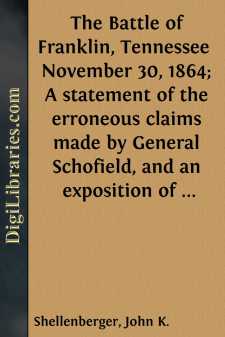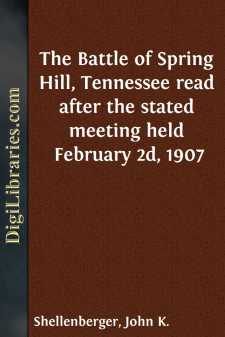Categories
- Antiques & Collectibles 13
- Architecture 36
- Art 48
- Bibles 22
- Biography & Autobiography 813
- Body, Mind & Spirit 142
- Business & Economics 28
- Children's Books 15
- Children's Fiction 12
- Computers 4
- Cooking 94
- Crafts & Hobbies 4
- Drama 346
- Education 46
- Family & Relationships 57
- Fiction 11828
- Games 19
- Gardening 17
- Health & Fitness 34
- History 1377
- House & Home 1
- Humor 147
- Juvenile Fiction 1873
- Juvenile Nonfiction 202
- Language Arts & Disciplines 88
- Law 16
- Literary Collections 686
- Literary Criticism 179
- Mathematics 13
- Medical 41
- Music 40
- Nature 179
- Non-Classifiable 1768
- Performing Arts 7
- Periodicals 1453
- Philosophy 64
- Photography 2
- Poetry 896
- Political Science 203
- Psychology 42
- Reference 154
- Religion 513
- Science 126
- Self-Help 84
- Social Science 81
- Sports & Recreation 34
- Study Aids 3
- Technology & Engineering 59
- Transportation 23
- Travel 463
- True Crime 29
The Battle of Franklin, Tennessee November 30, 1864; A statement of the erroneous claims made by General Schofield, and an exposition of the blunder which opened the battle
Description:
Excerpt
PREFACE
This monograph on the Battle of Franklin was read first at a meeting of the Minnesota Commandery of the Loyal Legion, December 9, 1902. Written after an exhaustive investigation begun many years before, the straightforward truth was told without fear or favor. The disgraceful and costly blunder with which the Battle of Franklin opened should have been investigated by a court of inquiry. The only action taken, however, was the deposing of General Wagner, the junior in rank and the weakest in influence among the generals implicated, from the command of his division, with the statement that the blunder was due to his disobedience of orders. With this action the matter was hushed up.
I have no personal grudge against General Schofield, whose obstinate reliance on his ability to foresee what General Hood would do, was the prime cause of the blunder. My feeling towards him is the same that any honest student will experience when he becomes convinced that an undeserved promotion was secured by dishonest methods. I began my investigation with no thought of him but to secure evidence to disprove statements that I knew to be false, dishonoring the brigade to which I belonged. These had been made by General Cox in The March to the Sea—Franklin and Nashville, and by Captain Scofield, a member of Cox’s staff, in a paper entitled “The Retreat from Pulaski to Nashville,” published in the second volume of Sketches of War History, issued by the Ohio Commandery of the Loyal Legion.
“Misery loves company,” and these two officers of the twenty-third corps, undoubtedly working in collusion, sought to mitigate their misery by putting two brigades of the fourth corps into the same class with their corps, whose battle line had proved unequal to the strain of the two brigades passing over it when driven in from the front by the assaulting rebel army. That part of Cox’s line broke in a panic at the sight of what was coming and abandoned a good line of breastworks before firing a single shot. Cox and Scofield wished to make it appear that the two brigades also became panic stricken and that they never stopped running until they were stopped by the river. That they were both capable of deliberately bearing false witness needs no other proof than that furnished by themselves—by Cox in the contradictory statements made in his two official reports of the Battle of Franklin, and by Scofield in his false map of Spring Hill, which he claimed was drawn to scale, but which he had forged to uphold his claim for extraordinary services rendered by the regiment to which he belonged in the Battle of Spring Hill the day preceding the Battle of Franklin.
The discovery of the discreditable part played by General Schofield in the Battle of Franklin was the greatest find of my investigation. There is not a bit of doubt that he remained heedless at his headquarters in Franklin while the enemy was engaged in preparations for assault in plain sight of our front. If he had given the proper attention to the important reports of General Cox, delivered in person, and of Colonel Lane, delivered by Captain Whitesides, he would have ridden to the front, which he could have done in less than ten minutes, to see for himself what was going on there....



